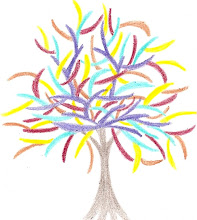On Saturday, Jenny and I set out to climb Table Mountain. There are lots of trails up the mountain, but we chose the Platteklip Gorge trail. The trail was more vertical than horizontal and we spent over two hours clambering up the rocks toward the top. We had beautiful weather for the hike, as well, with clear, sunny skies and temperatures in the upper sixties.
In order to get to the trailhead, we called a company called "Rikki's Taxi". This was an experience in and of itself. Rikki's Taxis are a mix between a pickup truck and a van. While they look like pickups, there is no separation between the cab and the bed. Instead of an ordinary truck bed, the back has benches along the sides and a roof. Passengers ride on these benches, so they are rotated 90 degrees from the traffic and hold on tight, since the benches have no seatbelts. The top half of the back is open, allowing passengers to look out at the drivers behind, who stare into the Rikki as though it is a circus tent. Definitely a fun and unique experience.
Platteklip Gorge was formed by water dripping down that part of the mountain for thousands of years. Thus, as we climbed up the gorge, we were surrounded by moving water. There were drips running down the sides of the rock on either side of us, which gathered into rivulets, streams, and even small waterfalls as they cascaded down the slope. Along the trail are lots of low bushes and ground plants. There are even several types of flowers that sprout up between the rocks on the trail, so the brown and gray rocks are dotted with yellow, pink, and purple blossoms.
As we climbed, we were passed by other hikers going both up and down the trail. The other climbers were all very friendly, smiling and wishing us well as we made our trek. We chatted briefly with a man from England who is spending five weeks vacationing in South Africa. We were joined in the last stretch of about fifteen minutes by a man who has climbed before and encouraged us to "keep going!" as we trudged up the last hundred meters.
When we finally reached the top, we felt incredibly accomplished. We hugged, despite the incredible amount of sweating we'd done, and began to look around the top of the mountain. To give you some idea of the location, Table Mountain is located literally in the center of Cape Town, at the base of a small peninsula. From the top of the mountain, you can see beaches on both sides, Robben Island in the harbor, the Waterfront, the Twelve Apostles (mountains that run down the peninsula), and Cape Point. We walked around on top for a bit, just to enjoy the view and look down on where we had come from. Only from that sort of height can you fully comprehend the sheer size of the city. It was amazing!
After looking around and taking tons of pictures, Jenny and I sat down to eat the apples and crackers we had packed for a snack at the top. As we were doing this, however, large rodents began to stalk us. There is a kind of rodent about the size of a beaver that is common atop Table Mountain. It looks like a hamster, but is actually related somehow to the elephant. In any case, these creatures obviously expect to be fed by tourists, so the little buggers surrounded the bench we were sitting on, then started closing in on us. A couple of them even came close enough to touch us, so we decided to put off our snack until we reached the bottom of the mountain.
Having exhausted ourselves on the climb up, we decided to take the cableway down. The cableway, which was based on a Swiss design, takes about four minutes to take passengers down the mountain. It has large, round cars with huge windows. As the car travels down the mountain, the floor rotates, allowing all the passengers to see out every side of the car during the descent. It is a really cool ride, though I was glad we hiked up.
So in one afternoon, I rode in a crazy open-backed taxi, hiked up a mountain, looked over the city, was stalked by R.O.U.S.'s (Rodents Of Unusual Size, for those of you who aren't familiar with The Princess Bride) and rode a Cable Car down a mountain. Now if only I knew how to get rid of spam in my blog comments...

